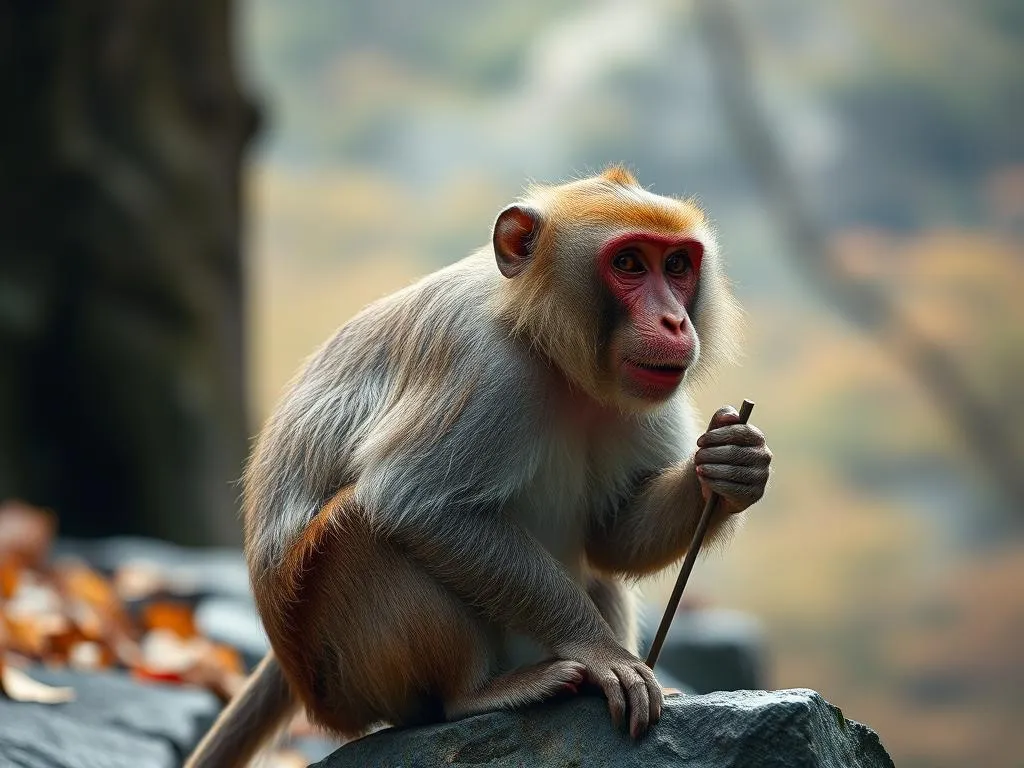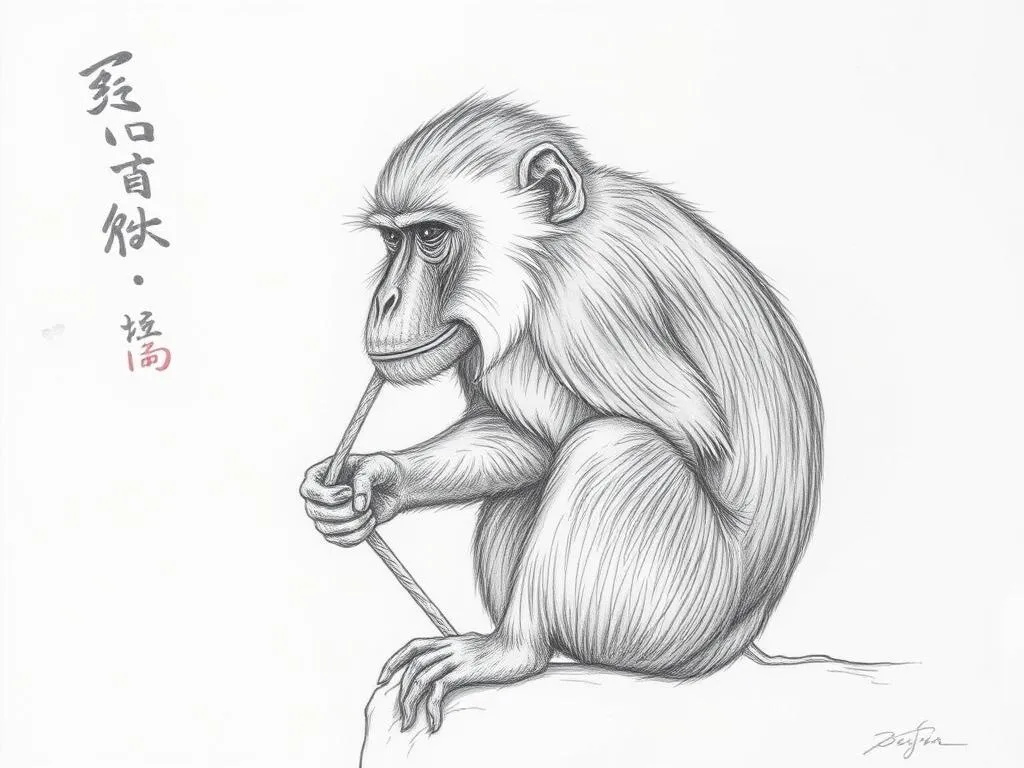The Symbolism of Japanese Macaques: Nature’s Playful Wisdom

Disclaimer: Some images on this website are AI-generated artworks and may not accurately represent real animals.
Understanding the Japanese Macaque
Overview of the Species
The Japanese macaque, also known as the snow monkey, is a fascinating primate known for its unique adaptations and social behavior. These monkeys inhabit the mountainous regions of Japan, displaying a remarkable range of intelligence and adaptability.
| Physical Characteristics | Details |
|---|---|
| Size | 50 to 70 cm in length |
| Weight | 8 to 14 kg |
| Fur Color | Sandy brown to grey |
| Facial Features | Pink skin on face and rear end |
| Lifespan | 20 to 30 years in the wild |
Habitat and Distribution
Japanese macaques thrive in various habitats, from subtropical forests to snowy mountains. They are found across Japan, most notably on Honshu, Shikoku, and Kyushu islands. Their adaptability allows them to survive in harsh climates, including the coldest regions where they are often seen bathing in hot springs.
Physical Characteristics and Behavior
These primates are well-known for their social structures and behaviors. They live in matrilineal groups, with females forming the core of the family unit. Their intelligence shines through in their problem-solving abilities and complex social interactions, making them a subject of interest for researchers and wildlife enthusiasts alike.
Cultural Significance in Japan
The Japanese macaque holds a significant place in Japanese culture. Historically, they have been revered as symbols of wisdom and playfulness, deeply intertwined with the nation’s folklore.
Historical Context
Japanese macaques have been part of Japan’s cultural narrative for centuries. They are often depicted in ancient texts and art, representing various traits that resonate with human experiences. Their presence in the Japanese landscape has made them a familiar sight, leading to a strong connection with local communities.
Role in Japanese Folklore and Mythology
In Japanese folklore, these monkeys are often associated with the divine. They are featured in stories that highlight their cleverness and ability to overcome challenges. Folktales frequently portray them as messengers of the gods, bridging the gap between the human and spiritual worlds.

Symbolism & Spiritual Meaning
Intelligence and Adaptability
One of the most prominent traits of the Japanese macaque is its intelligence. These monkeys are not only clever but also exhibit remarkable adaptability, which is symbolic of resilience and resourcefulness.
Problem-Solving Abilities
Japanese macaques are known for their problem-solving skills. They have been observed using tools, such as stones, to crack open nuts. This ability to manipulate their environment reflects a deeper message about the importance of ingenuity in overcoming life’s obstacles.
Social Structures and Communication
Their complex social structures are another testament to their intelligence. They communicate through a variety of vocalizations and body language, which emphasizes the significance of social bonds and cooperation. This serves as a reminder of the importance of community and connection in our own lives.
Playfulness and Joy
The Japanese macaque is also a symbol of playfulness and joy. Their playful nature is infectious, reminding us of the importance of laughter and happiness.
Representation of Happiness
These monkeys are often seen engaging in playful antics and social grooming, which fosters bonds within their groups. Their joyous spirit encapsulates the essence of living in the moment and finding joy in everyday life.
Importance of Play in Life
Play is not just a leisure activity for these primates; it is a crucial aspect of their development and social structure. It teaches them essential survival skills and strengthens community ties, illustrating that playfulness is vital for personal and communal growth.
Balance and Harmony
The Japanese macaque embodies balance and harmony, both within its social structure and its relationship with nature.
Living in Cohesion with Nature
These monkeys have adapted to their environment in ways that promote sustainability. They forage for food while also ensuring that they do not deplete their resources, highlighting the importance of living in harmony with nature.
Symbol of Family and Community
Their strong familial bonds serve as a model for human relationships. The emphasis on nurturing and caring for one another within macaque groups speaks to the importance of family and community in achieving a balanced life.
Cunning and Resourcefulness
The Japanese macaque is often viewed as a symbol of cunning and resourcefulness, showcasing the importance of adaptability in the face of challenges.
Survival Skills
Their ability to adapt to various environments and situations is a powerful lesson in survival. Whether foraging for food or evading predators, Japanese macaques exemplify the need to be resourceful in challenging circumstances.
Lessons in Creativity
Observing their behaviors can inspire us to think creatively in our own lives. The cunning nature of these monkeys encourages us to approach problems with innovative solutions and to embrace change rather than fear it.
Japanese Macaque in Dreams
Common Dream Scenarios
Dreaming about the Japanese macaque can carry significant meanings, often reflecting our subconscious thoughts and feelings.
| Dream Scenario | Possible Interpretation |
|---|---|
| Interacting with macaques | Messages of playfulness and joy |
| Observing macaques in nature | Insights into social dynamics and relationships |
| Seeing a macaque alone | Reflection on personal growth and adaptability |
Interpretations of Dreaming About Macaques
Dreams involving the Japanese macaque can reveal much about our inner selves and current life situations.
Messages of Playfulness and Joy
Interacting with these monkeys in a dream may symbolize a need to embrace joy and playfulness in waking life. It serves as a reminder to lighten up and find happiness in simple moments.
Insights into Social Dynamics and Relationships
Observing macaques can reflect our social interactions and relationships. It may prompt us to examine how we connect with others and the importance of community in our lives.
Reflection on Personal Growth and Adaptability
Dreaming of a lone macaque might indicate a period of reflection or personal growth. It encourages introspection and adaptability, suggesting that we embrace change and evolve in our personal journeys.
Modern Interpretations
Japanese Macaque in Art and Literature
The Japanese macaque continues to inspire artists and writers, serving as a muse in various forms of expression.
Depictions in Traditional and Contemporary Works
From ancient scrolls to modern photography, these monkeys are often portrayed as symbols of wisdom and playfulness. Their unique characteristics make them a popular subject in both traditional and contemporary art.
Influence on Modern Storytelling
The narratives surrounding Japanese macaques have influenced storytelling in literature and film, highlighting themes of intelligence, community, and the beauty of nature. Their stories resonate with audiences, bridging cultural gaps and fostering a deeper understanding of wildlife.
Symbol of Environmental Awareness
In recent times, the Japanese macaque has become a potent symbol of environmental awareness and conservation.
Importance of Conservation
As their habitats face threats from climate change and human activity, these monkeys serve as a reminder of the need for conservation efforts. Their plight highlights the interconnectedness of all species and the urgency of protecting our planet.
Representation of Climate Change Challenges
The adaptation of Japanese macaques to changing environments reflects the broader challenges faced by wildlife in the age of climate change. Their resilience inspires action and awareness about the pressing environmental issues we face today.
Cultural Festivals and Celebrations
The cultural significance of the Japanese macaque is celebrated in various festivals across Japan.
Events Celebrating Japanese Macaques
Festivals often feature traditional dances, art displays, and educational programs focusing on the importance of these monkeys in Japanese culture. These events foster community spirit and encourage conservation efforts.
Impact on Community Identity
Celebrating the Japanese macaque strengthens community identities, reminding people of their connection to nature and the collective responsibility to protect it. This cultural bond enhances the appreciation for wildlife and the natural world.
Key Takeaways
- Summary of Symbolism and Significance
- The Japanese macaque symbolizes intelligence, adaptability, playfulness, and community.
- Their role in folklore underscores their cultural significance and connection to nature.
-
Observing their behavior teaches valuable lessons about resilience and resourcefulness.
-
Lessons from the Japanese Macaque
- Embrace joy and playfulness in everyday life.
- Acknowledge the importance of community and familial bonds.
- Approach challenges with creativity and adaptability.
Conclusion
The Japanese macaque serves as a powerful reminder of the wisdom inherent in nature. Their symbolism encompasses joy, intelligence, and community, encouraging us to connect with our environment and each other. As we reflect on the role of the Japanese macaque in our lives, may we be inspired to embrace the playful spirit they embody and the valuable lessons they impart about living harmoniously with the world around us.







